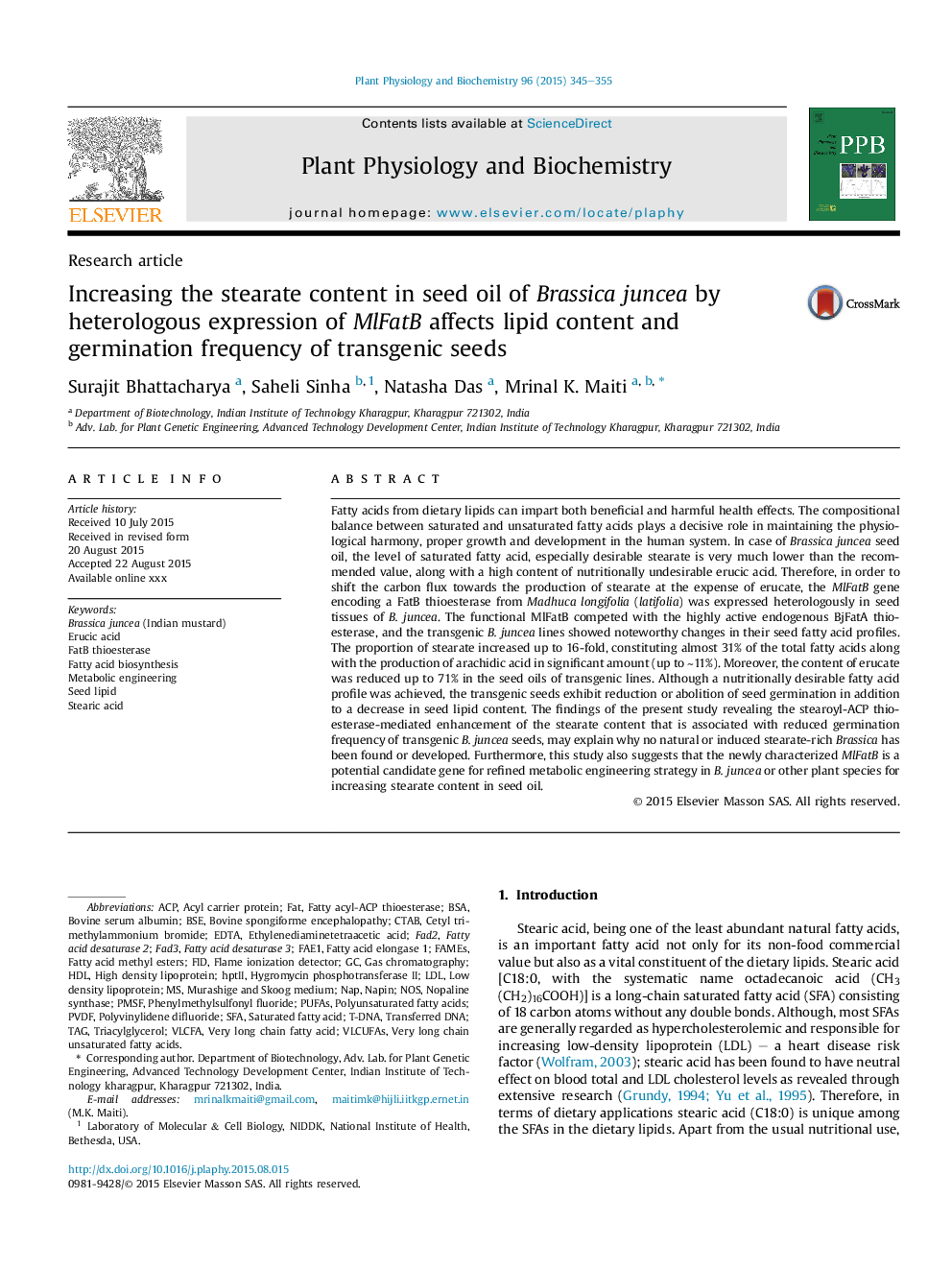| کد مقاله | کد نشریه | سال انتشار | مقاله انگلیسی | نسخه تمام متن |
|---|---|---|---|---|
| 8354780 | 1541925 | 2015 | 11 صفحه PDF | دانلود رایگان |
عنوان انگلیسی مقاله ISI
Increasing the stearate content in seed oil of Brassica juncea by heterologous expression of MlFatB affects lipid content and germination frequency of transgenic seeds
دانلود مقاله + سفارش ترجمه
دانلود مقاله ISI انگلیسی
رایگان برای ایرانیان
کلمات کلیدی
FAD2HDLVLCFAPUFAsPMSFSFAT-DNAACPPVDFFAE1transferred DNAFAD3BSENAPNOSCTABBSA - BSAMurashige and Skoog medium - Murashige و Skoog mediumflame ionization detector - آشکارساز یونیزاسیون شعلهbovine serum albumin - آلبومین سرم گاوEDTA - اتیلن دی آمین تترا استیک اسید Ethylenediaminetetraacetic acid - اتیلینیدامین تتراستیک اسیدcetyl trimethylammonium bromide - استاتیم ترتیل آمونیوم برومیدStearic acid - اسید استئاریک Erucic acid - اسید اوروکیکsaturated fatty acid - اسید چرب اشباع شدهPolyunsaturated fatty acids - اسید چرب اشباع نشدهfatty acid desaturase 2 - اسید چرب دارونما 2Very long chain fatty acid - اسید چرب زنجیره ای بسیار طولانیFatty acid biosynthesis - بیوسنتز اسید چربtriacylglycerol - تری آسیل گلیسرول TAG یا triacylglycerols - تری گلیسرید یا تری آسیل گلیسرولFID - درNapin - دکمهpolyvinylidene difluoride - دی فلوئورید پلی وینیلیدینnopaline synthase - سنتاز ناپلینFAMEs - شهرتphenylmethylsulfonyl fluoride - فنیل متیل سولفونیل فلورایدhigh density lipoprotein - لیپوپروتئین با چگالی بالاlow density lipoprotein - لیپوپروتئین چگالی کمLDL - لیپوپروتئین کم چگالی(کلسترول بد)fatty acid methyl esters - متیل استرهای اسید چربMetabolic engineering - مهندسی متابولیکacyl carrier protein - پروتئین حامل آکیلFat - چربیGas chromatography - کروماتوگرافی گازی
موضوعات مرتبط
علوم زیستی و بیوفناوری
علوم کشاورزی و بیولوژیک
دانش گیاه شناسی
پیش نمایش صفحه اول مقاله

چکیده انگلیسی
Fatty acids from dietary lipids can impart both beneficial and harmful health effects. The compositional balance between saturated and unsaturated fatty acids plays a decisive role in maintaining the physiological harmony, proper growth and development in the human system. In case of Brassica juncea seed oil, the level of saturated fatty acid, especially desirable stearate is very much lower than the recommended value, along with a high content of nutritionally undesirable erucic acid. Therefore, in order to shift the carbon flux towards the production of stearate at the expense of erucate, the MlFatB gene encoding a FatB thioesterase from Madhuca longifolia (latifolia) was expressed heterologously in seed tissues of B. juncea. The functional MlFatB competed with the highly active endogenous BjFatA thioesterase, and the transgenic B. juncea lines showed noteworthy changes in their seed fatty acid profiles. The proportion of stearate increased up to 16-fold, constituting almost 31% of the total fatty acids along with the production of arachidic acid in significant amount (up to â¼11%). Moreover, the content of erucate was reduced up to 71% in the seed oils of transgenic lines. Although a nutritionally desirable fatty acid profile was achieved, the transgenic seeds exhibit reduction or abolition of seed germination in addition to a decrease in seed lipid content. The findings of the present study revealing the stearoyl-ACP thioesterase-mediated enhancement of the stearate content that is associated with reduced germination frequency of transgenic B. juncea seeds, may explain why no natural or induced stearate-rich Brassica has been found or developed. Furthermore, this study also suggests that the newly characterized MlFatB is a potential candidate gene for refined metabolic engineering strategy in B. juncea or other plant species for increasing stearate content in seed oil.
ناشر
Database: Elsevier - ScienceDirect (ساینس دایرکت)
Journal: Plant Physiology and Biochemistry - Volume 96, November 2015, Pages 345-355
Journal: Plant Physiology and Biochemistry - Volume 96, November 2015, Pages 345-355
نویسندگان
Surajit Bhattacharya, Saheli Sinha, Natasha Das, Mrinal K. Maiti,